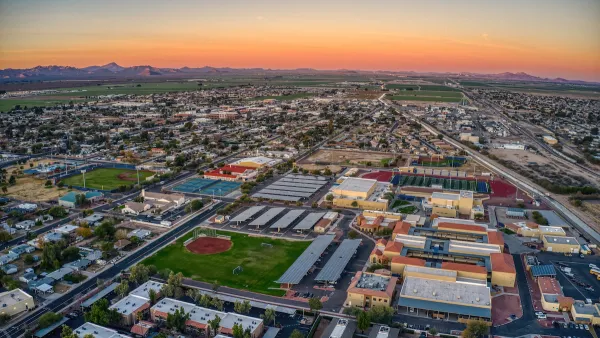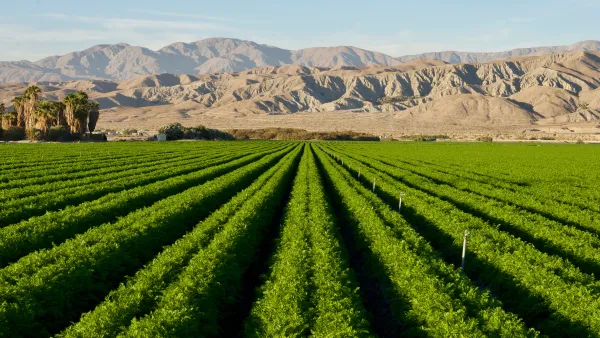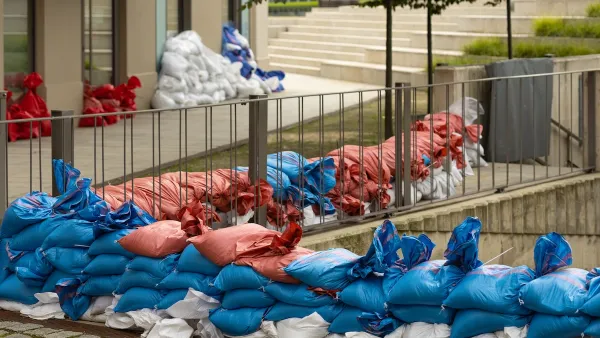The Colorado River is struggling to provide enough water for 25 million people, which could lead to water shortages and water wars in the areas that rely on its bounty. Officials are looking to find a long-term solution, reports Felicity Barringer.
"As far as future water supplies go, the outlook is not good," says Barringer. "Most Colorado River water is currently used for agriculture, but that is beginning to shift as the cities of the Southwest continue to grow." The basin is next to fall victim to America's water crisis as the demand for water exceeds supply, and the effects of climate change could bring less rain to the region. The Bureau of Reclamation has been considering traditional solutions to the water shortage including "decreasing demand through conservation and increasing supply through reuse or desalination projects," but "a more extreme and contentious approach" is the building of a 600-mile pipeline from the Missouri River to Denver that would provide water as needed and store the remaining in reservoirs. Experts say "the plan is reminiscent of those proposed in the middle of the last century, when grand and exorbitant federal water projects were common place — and not, with the benefit of hindsight, always advisable," which shows just how serious the problem has become for the Colorado River.
The pipeline would provide the Colorado River with 600,000 acre-feet of water annually from the Missouri and Missippi River systems, enough to serve roughly a million single-family homes, but the loss of water from those rivers would likely face strong opposition from the affected states. The project would also require local taxpayers and utility customers to shoulder the costs of the project, which could cost billions of dollars. The proposal "shows you the degree to which water-short entities in the Colorado River basin are willing to go to get water" from somewhere elsewhere, said Burke W. Griggs, the counsel for the Kansas Agriculture Department's division of water resources. If the Colorado River cannot supply enough water, the fear is that water wars could restart as states fight over dwindling water sources. Jason Bane of Western Resource Advocates described the pipeline idea as "fundamentally 20th-century water-policy thinking that doesn't work in the 21st century" and said, "We clearly need to conserve and be more efficient with the water we have."
FULL STORY: Water Piped to Denver Could Ease Stress on River

Analysis: Cybertruck Fatality Rate Far Exceeds That of Ford Pinto
The Tesla Cybertruck was recalled seven times last year.

National Parks Layoffs Will Cause Communities to Lose Billions
Thousands of essential park workers were laid off this week, just before the busy spring break season.

Retro-silient?: America’s First “Eco-burb,” The Woodlands Turns 50
A master-planned community north of Houston offers lessons on green infrastructure and resilient design, but falls short of its founder’s lofty affordability and walkability goals.

Test News Post 1
This is a summary

Analysis: Cybertruck Fatality Rate Far Exceeds That of Ford Pinto
The Tesla Cybertruck was recalled seven times last year.

Test News Headline 46
Test for the image on the front page.
Urban Design for Planners 1: Software Tools
This six-course series explores essential urban design concepts using open source software and equips planners with the tools they need to participate fully in the urban design process.
Planning for Universal Design
Learn the tools for implementing Universal Design in planning regulations.
EMC Planning Group, Inc.
Planetizen
Planetizen
Mpact (formerly Rail~Volution)
Great Falls Development Authority, Inc.
HUDs Office of Policy Development and Research
NYU Wagner Graduate School of Public Service




























